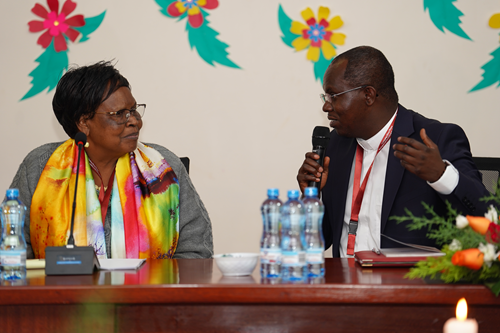The ongoing second African Women Theologian Conference at Hekima University college (HUC) in Kenya’s capital Nairobi, comes weeks after the 20th Plenary assembly of the symposium of Episcopal Conferences of Africa and Madagascar (SECAM) that was in Kigali, Rwanda, where African bishops, pastoral leaders, and theologians outlined Vision 2050.
In his welcoming remarks on Tuesday, September 2, Fr. Marcel Uwineza, the Principal of HUC, drew inspiration from SECAM’s recent deliberations, and described the gathering of about 100 participants from across Africa alongside others who were following online, as “one of the first concrete fruits of Vision 2050.”
“Women theologians are not just participants in the life of the Church, they are partners in shaping its very identity,” Fr. Uwineza a member of the Society of Jesus (SJ) pointed out as the conference kicked off highlighting that vision 2025 calls for a Church “that is not only growing in numbers but maturing in identity, deep in reflection, dynamic in leadership, prophetic in witness, and open to new frontiers.”
Fr. Uwineza emphasized that African theology must be rooted in local realities and that women theologians have a crucial role in making this vision a reality.
“Vision 2050 insists that the African Church must not rely on borrowed paradigms. Women theologians stand at the forefront of generating reflection that is both authentically African and genuinely Catholic,” Fr. Uwineza said.
Echoing the Kigali discussions when the Bishops of Africa and the Islands challenged the Church to move beyond clericalism to a truly synodal model of shared leadership, Fr. Uwineza underlined the importance of recognizing women, youth, and lay professionals as co-leaders in mission.
He also highlighted the prophetic role of African women, many of whom are already confronting injustice, poverty, corruption, and ecological degradation at the grassroots level saying, “Their lived witness strengthens the Church’s prophetic voice.”
While praising the conference as a platform where African women theologians bring creativity and courage to the pressing frontiers, Fr. Uwineza further pointed to the need for boldness in addressing new realities including; digital evangelization, interfaith dialogue, youth engagement, and global interconnectedness.
He envisioned the conference as “a turning point” in the life of the Church in Africa, saying, “Women theologians are not to remain on the margins. They are co-architects of the ecclesiological and missional pathways that will guide the Church into the next generation. And the Church cannot reach its fullness without the voices of its daughters.”

